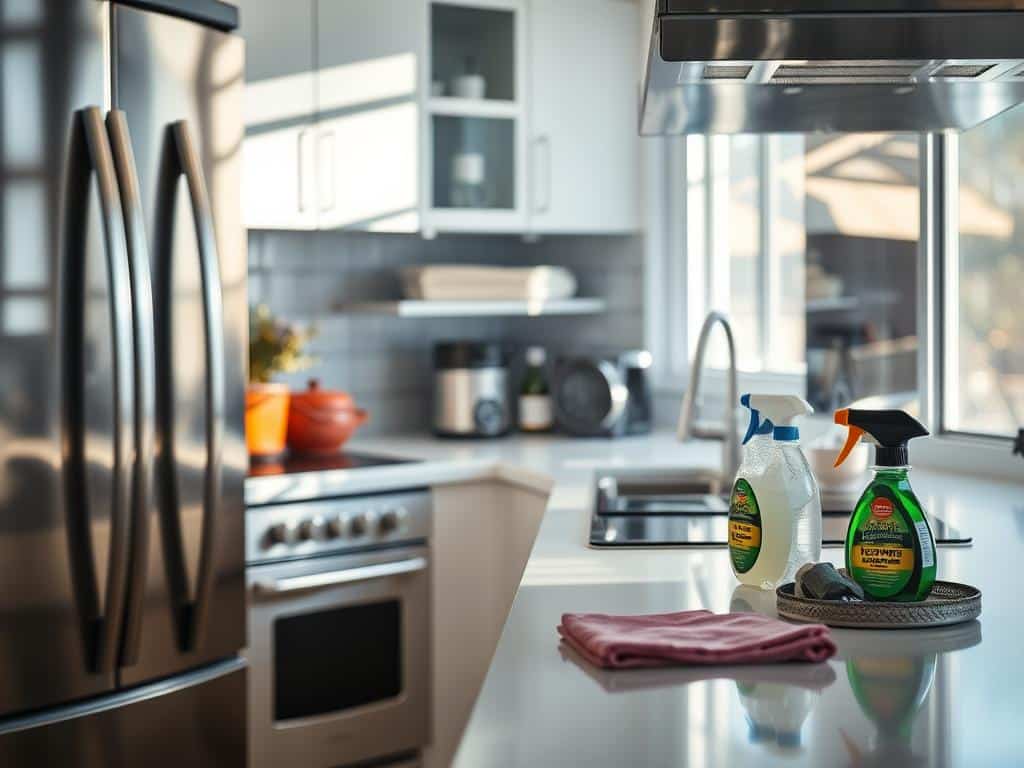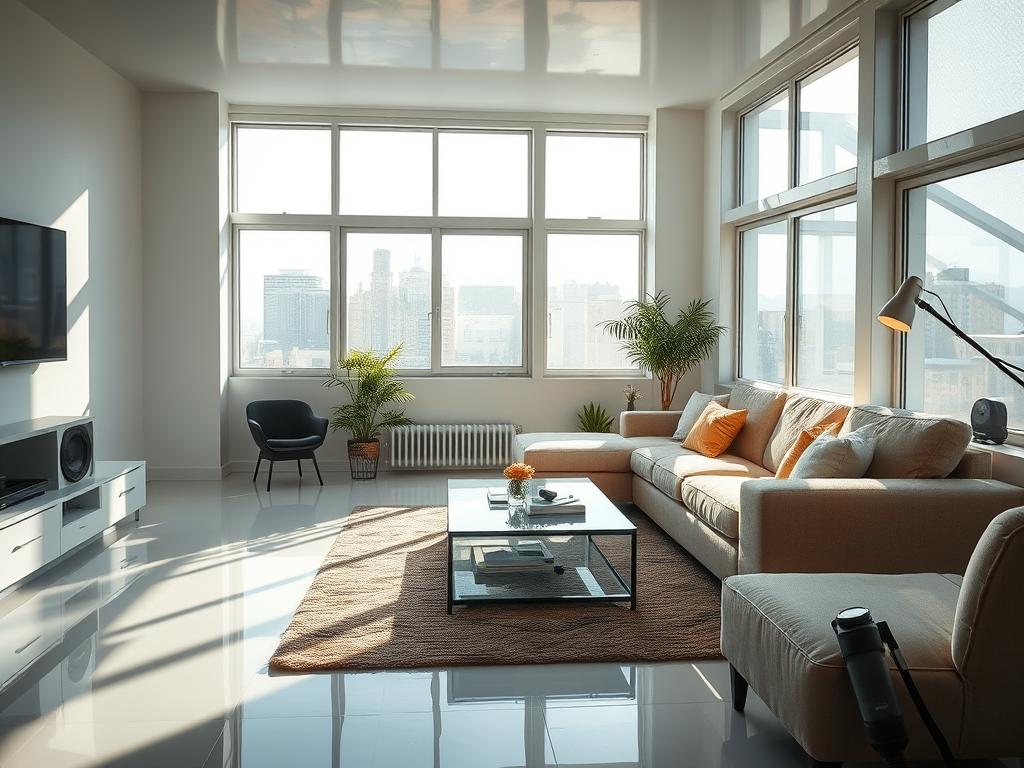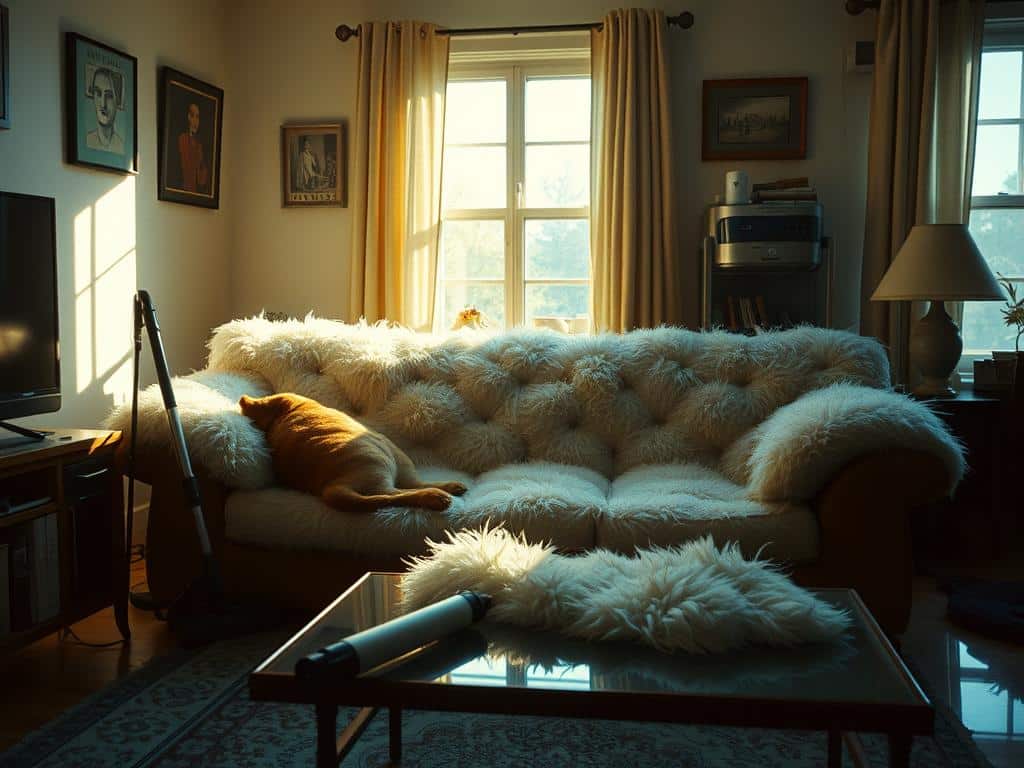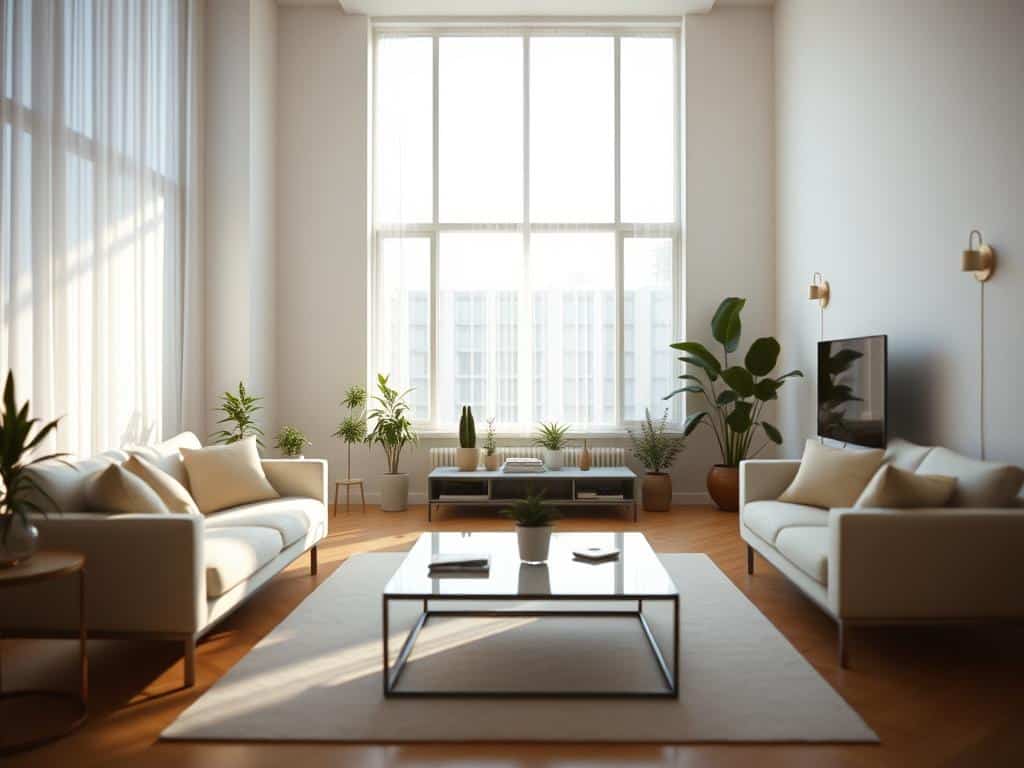
Starting on a minimalist journey and aiming for a clutter-free space might seem hard at first. But, organizing your home is both doable and full of perks. Dale Carnegie once said, finding joy in what we do makes a big difference. This is true for decluttering, turning a big chore into a fun process.
Begin organizing your home by choosing where to start. Use quick five-minute clean-ups, give away things, and follow a list. These steps help create more room but also make you feel better by cutting down on mess. A tidy home leads to a calm atmosphere, boosting your productivity and focus.
Decluttering also comes with money benefits. Getting rid of items you don’t need frees up space. This means you may not need to pay for extra storage. Even real estate agents say decluttering helps sell your home faster, sometimes at a higher price.
Start by picturing the perfect space you want. Dive into decluttering with excitement. Whether you’re going for minimalism or just an orderly area, these tips will help you get to a clutter-free space.
The Benefits of Decluttering Your Life
Decluttering does more than just clean up; it brings big mental and financial perks. By organizing your space, you get a tidy home, less stress, and better finances. Let’s explore the big pluses of living declutter-free.
Less to Clean
A clutter-free home is easier to keep clean. You spend less time cleaning and more enjoying your space. Also, less clutter means less dust and allergens, which is good for your health.
Less to Organize
Decluttering leads to a more organized life. Fewer items mean you spend less energy keeping things in order. Scientists at Princeton University found that a tidy space boosts performance and clarity.
Less Stress
Lowering stress is a key perk of decluttering. Research by UCLA shows that too many items at home can make stress worse. A tidy space helps you feel better emotionally by cutting down daily stress.
Less Debt
Decluttering helps you manage your spending better. It keeps you from buying things you don’t need. This not only helps save money but also encourages smarter spending habits. A survey by Charles Schwab found that 59% of American homes are living paycheck to paycheck; decluttering can help change that.
More Financial Freedom
Saving money and selling things you don’t want gives you more financial freedom. This extra money can make life less stressful. According to Denise Driscoll of Mather Hospital, decluttering helps you save time and money.
More Energy for Your Passions
Having less clutter frees up your energy. It lets you focus on what makes you happy and fulfilled. Decluttering doesn’t just make you feel better; it lets you spend time on your hobbies more effectively.
For more tips on keeping a clean, stress-free home, check out this guide on air duct cleaning.
Where to Begin With Decluttering
Feeling overwhelmed by decluttering? Break it down into easy steps. This method keeps you motivated and moving forward.
Start Small
Start with something simple, like a drawer or part of your counter. It’s less scary and feels great to finish. Seeing your progress can encourage you to do more. Soon, you’ll be ready to tackle bigger areas.
Set Realistic Goals
It’s important to set goals you can hit. Try decluttering for just five minutes daily. Or pick a weekend for a big clean-up. These goals help you stay on track without feeling swamped.
Create a Checklist
A checklist will guide you through your decluttering journey. List every spot in your house that needs work. Go through them one at a time. It keeps you organized and ensures you don’t miss anything.
Checklists also motivate you by showing what you’ve achieved. They make decluttering feel less daunting. With these tips, you’ll have a tidier home before you know it.
Creative Decluttering Strategies
Getting creative with decluttering can make organizing easier. Begin with short decluttering sessions, like five minutes at a time. This builds a habit slowly and feels less daunting than longer sessions. Experts, including Lewis, suggest using a timer to stay focused and avoid distractions.
5-Minute Decluttering Sessions
Short decluttering sessions work well. Try decluttering for 5, 10, or 30 minutes daily, as Lewis recommends. It helps you make progress without getting overwhelmed. Just a few minutes each day can lead to a decluttered space gradually.
Give One Item Away Each Day
Giving away one item daily can drastically cut down clutter. This steady approach makes decluttering manageable. By giving away items regularly, you greatly improve your space.
Fill a Trash Bag
A trash bag is great for collecting items to donate or toss. It shows how much you’re removing, offering quick satisfaction. This method is perfect for those who like immediate results.
Donate Clothes You Never Wear
Regularly choosing clothes you don’t wear to donate can significantly help. A Kantar survey found 44% of homeowners feel stressed by mess weekly. Donating clothes reduces this stress and organizes your wardrobe.
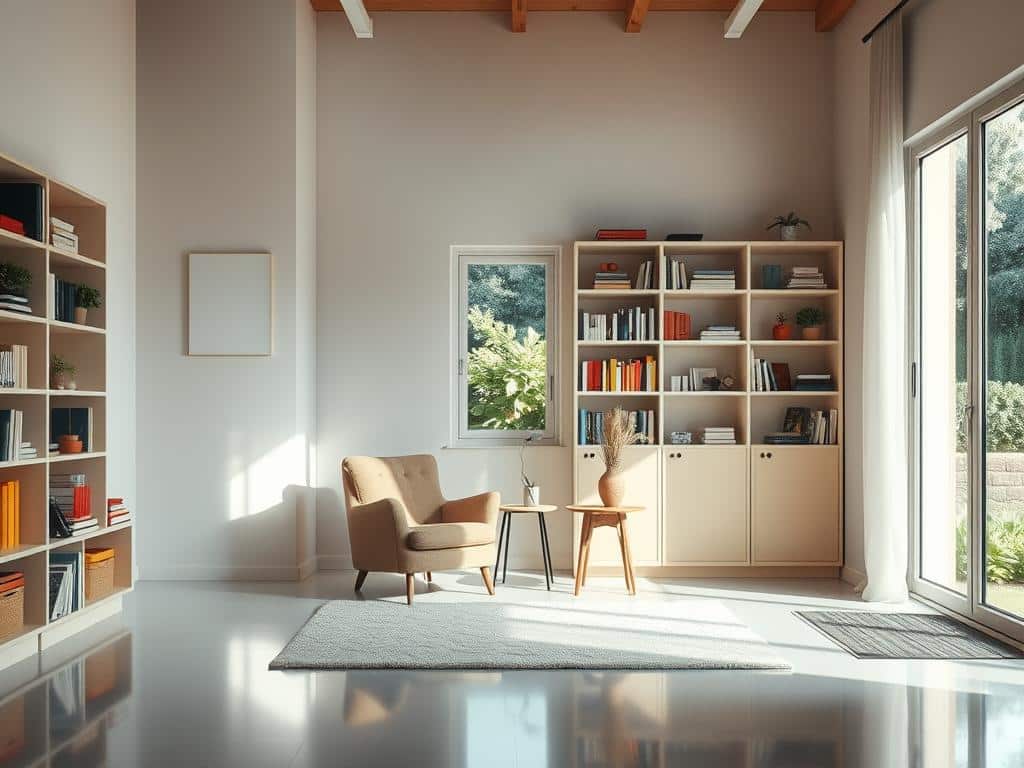
Use a Decluttering Checklist
Checklists can greatly help with decluttering. They guide you, making sure you don’t overlook anything. WeThrift experts advise making a plan with realistic goals. Checklists help achieve this plan.
The 12-12-12 Challenge
The 12-12-12 challenge makes decluttering fun. You pick 12 items to toss, 12 to donate, and 12 to put away. This method makes decluttering a game and shows real results.
The Four-Box Method
The Four-Box Method simplifies decisions. Use four boxes: keep, donate, trash, and store. Sorting items becomes easier. For a detailed guide on organizing, visit this comprehensive method.
Decluttering Tips for Every Room
Decluttering your home means finding the right strategy for each room. This ensures your home stays tidy and easy to manage. Here are key tips for every room to make your house more organized and calm.
Living Room
The living room is a busy spot and often gets messy. Start with fewer decorations and choose furniture that serves more than one purpose. This will help keep things neat:
- Organize toys into designated storage spaces.
- Use furniture with hidden storage options.
- Keep surfaces clear by storing remotes and small items in a basket.
- Regularly purge magazines, books, and newspapers.
- Adopt the one-in-one-out rule for new items.
Kitchen
To declutter your kitchen, keep counters clear and cupboards organized. This makes your kitchen look better and work better. Key steps include:
- Check food expiry dates and discard outdated items.
- Perform regular freezer audits and organize by food type.
- Use clear containers for pantry items to easily identify contents.
- Keep frequently used utensils and gadgets within reach.
- Store lesser-used appliances out of sight to free up counter space.
- Group similar items together for easier access.
- Consider the 90/90 rule to assess kitchen tools and gadgets.
Bedroom
A calming bedroom is key to relaxation. A simple wardrobe and tidy nightstands help create a peaceful space. Follow these tips:
- Sort through clothes regularly, donating or selling items you no longer wear.
- Invest in under-bed storage solutions.
- Keep nightstands clutter-free with limited décor.
- Use storage boxes for seasonal clothing.
- Organize accessories in separate compartments.
- Evaluate if each item aids relaxation or creates clutter.
- Apply the one-in-one-out rule to new clothing purchases.
Bathroom
For a neat bathroom, throw away expired products and keep essentials. Here’s how to keep it clean and functional:
- Regularly check product expiration dates and discard old items.
- Organize toiletries by usage frequency, keeping essentials accessible.
- Use trays or baskets to store and group similar items together.
- Implement wall-mounted storage to maximize space.
- Adopt a minimalist approach to reduce visual and physical clutter.
Customizing your decluttering approach for each room makes your home a set of peaceful spaces. For detailed tips, check out this room-specific decluttering guide.
| Room | Number of Tips | Focus |
|---|---|---|
| Living Room | 5 | Toy Organization & Multi-use Furniture |
| Kitchen | 7 | Food Expiry Checks & Freezer Audits |
| Bedroom | 7 | Clothing Organization & Storage Solutions |
| Bathroom | 3 | Discard Outdated Items & Check Expiration Dates |
Maintaining a Clutter-Free Home
Keeping your home free from clutter is an ongoing effort. It goes beyond just the first clean-up. To keep clutter away, organize your daily life. This means you should regularly clear off surfaces and have specific spots for items you use often. Also, avoid buying things you don’t need. These steps make staying tidy a habit.
A look at the numbers shows how much difference good clutter management can make:
| Measure | Before | After |
|---|---|---|
| Percentage of people living in cluttered homes | 80% | 20% |
| Average number of possessions removed during decluttering process | — | 100 items |
| Frequency of clutter recurrence | High | Low |
| Challenge in believing in a clutter-free home | High | Low |
By adopting a minimalist approach, you can keep your space clean longer. It’s crucial to regularly check what you own and set clear goals. This helps prevent quick, thoughtless decluttering where things are tossed out without sorting.
Family issues or health problems can make it tough to keep up with clutter control. Yet, having a system helps keep things in order, especially during tough times. Over years of minimalist living, some find keeping a donation box handy reinforces the habit of continual clearing out.
Having a clutter-free home is not a one-off task but a lasting commitment. Live by minimalism and be careful with new additions to your space. By remembering your past decluttering successes, you’ll stay motivated and keep your home peacefully tidy.
Mindset and Motivation for Decluttering
Starting your decluttering journey is more than just cleaning up; it’s about having the right mindset and being motivated. The right mindset turns an ordinary chore into an exciting adventure. Using visualization helps you see your goals clearly. It makes decluttering inspirational by having a vivid picture of the clean space you want.
Visualize Your Ideal Space
Before you start, imagine how your space will look without clutter. Picture the peace, roominess, and calm in your home. Setting clear goals makes decluttering easier and keeps you focused. Try taking pictures before and after decluttering. These photos remind you of your progress and encourage you to keep going.
Make Decluttering Fun
Make decluttering enjoyable to boost productivity and have fun. Declutter with friends to make it a sociable event. Listen to your favorite songs, or set a musical timer for short decluttering bursts. Treat it like a game. Rewarding yourself for small achievements makes decluttering something you look forward to.
Stay Inspired by Minimalism
Minimalism can guide you in deciding what to keep and what to let go of. It helps you prioritize what’s important in your home and life. Use Rita’s “Essential Checklists” Decluttering Workbook for guidance. It has specific checklists and 30-day challenges. Understanding your motivations through tests like Meyers-Briggs or Enneagram personalizes your decluttering strategy.
Decluttering benefits your mental health, not just your home’s look. It reduces stress and can help with anxiety and depression. Remember to take short breaks to avoid feeling burnt out. Keeping a positive attitude helps you change your space and leads to a clutter-free, balanced life.

